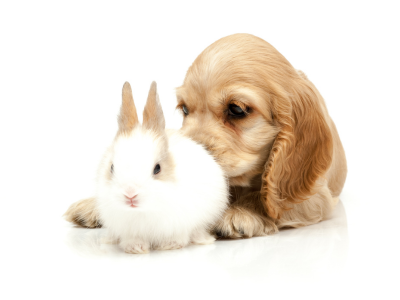In the midst of a joyful outdoor excursion or a regular backyard visit, pet owners often witness their dogs engaging in unexpected behaviors, one of which may include munching on rabbit poop scattered in the grass. If you’ve spotted your canine friend feasting on these small, round droppings, you might be understandably concerned about the potential health risks.

Is Rabbit Poop Dangerous for Dogs?
Contrary to popular belief, rabbit feces, on their own, are not typically dangerous for dogs. Rabbits are hindgut fermenters with a unique digestive process that often leaves their droppings packed with fibrous material. That said, there’s more to the story. A dog’s reaction to consuming rabbit feces can depend on various factors.
Why Rabbit Poop Can Be Harmful
While rabbit droppings themselves may not directly pose a threat, they can harbor harmful pathogens and parasites like coccidia, tularemia, and even giardia.1 These parasites can potentially cause illnesses if transmitted to your dog, depending on your pet’s immune status and the number of parasites in the feces.
The danger to your pet depends on several factors, including the number of droppings ingested, the dog’s size and overall health, and the presence of parasites in the poop. For example, a small, aging, or immunocompromised dog might be at a higher risk compared to a healthy, young, or larger dog.
Symptoms of Sickness
If your dog has eaten rabbit poop and becomes sick, they may display symptoms such as:
- Diarrhea: If your dog ate rabbit poop infected with parasites like coccidia or giardia, it might result in loose, watery stools. It’s crucial to keep your pet hydrated during this time.
- Vomiting: Vomiting can be a response to an infection from parasites present in rabbit poop. Frequent vomiting can lead to dehydration, making it vital to provide your dog with enough water and contact your vet.
- Loss of Appetite: If your dog isn’t feeling well due to an infection or infestation, they might lose their appetite. Giardia, for instance, can cause a decreased desire to eat.
- Lethargy: When your dog is feeling unwell, they may appear tired or show less interest in activities they usually enjoy. Lethargy can be a symptom of many illnesses, including a systemic infection like tularemia.
- Dehydration: Persistent diarrhea or vomiting can lead to dehydration. Signs of dehydration include dry nose and gums, sunken eyes, and reduced skin elasticity. If your dog shows signs of dehydration, contact your vet immediately.
As for potential parasites and diseases:
- Coccidia: This is a group of microscopic parasites that can cause a disease called coccidiosis, leading to watery, mucous-filled diarrhea. If left untreated, it can result in severe dehydration and, in extreme cases, death.
- Giardia: Giardia is a single-celled parasite that lives in your dog’s intestines. It can cause a range of symptoms including diarrhea, vomiting, weight loss, and general poor condition.
- Tularemia: Also known as “rabbit fever,” tularemia is a bacterial disease that can be transmitted to dogs through the consumption of infected rabbit poop. Symptoms can vary but may include lethargy, reduced appetite, and fever. In some cases, tularemia can cause severe illness and requires immediate veterinary attention
What to Do and When to Contact a Professional
If your dog shows any of the above symptoms after eating rabbit poop, it’s crucial to contact your vet immediately. Even if they appear fine, it’s a good idea to keep a close eye on their behavior and health. Regular fecal exams are an essential preventive measure to keep potential parasite infestations in check.
Concluding Thoughts: Dogs and Rabbit Poop
 While rabbit poop isn’t typically dangerous in itself, it can potentially carry parasites that might pose a risk to your dog. Factors like your dog’s size, health, and the amount of poop consumed can affect the potential danger. Keep a close watch on your pet and seek veterinary help if they exhibit any signs of illness
While rabbit poop isn’t typically dangerous in itself, it can potentially carry parasites that might pose a risk to your dog. Factors like your dog’s size, health, and the amount of poop consumed can affect the potential danger. Keep a close watch on your pet and seek veterinary help if they exhibit any signs of illness
Citations
Cyniclomyces guttulatus Infection in Dogs: 19 Cases (2006–2013), (2016).
https://meridian.allenpress.com/
Frequently Asked Questions
-
Dogs are naturally attracted to the strong scent and fibrous content of rabbit droppings. It’s a behavioral trait ingrained from their wild ancestors who often used feces to get information about other animals in their environment.
-
Most dogs will be perfectly fine after eating rabbit poop. However, if the droppings contain parasites, your dog could potentially get sick. Watch for symptoms such as diarrhea, vomiting, and lethargy.
-
Rabbit droppings can potentially contain parasites like coccidia, giardia, or the bacteria that causes tularemia. If transmitted to your dog, these can cause symptoms ranging from mild gastrointestinal upset to more severe conditions like diarrhea, dehydration, and in rare cases, more serious systemic infections.

